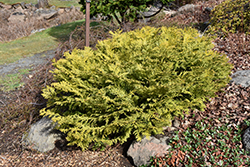It's all about ...
plants

Golden False Arborvitae
Thujopsis dolabrata 'Aurea'
Height: 6 feet
Spread: 4 feet
Sunlight:
![]()
![]()
![]()
Hardiness Zone: 6a
Other Names: Aurea Hiba Arborvitae, Golden Elk Horn Cypress
Description:
A very slow growing mounded evergreen shrub with golden yellow new growth that is retained into summer; tidy rounded form needs little pruning, a great color accent for home gardens; closely related to the North American white cedar (arborvitae)
Ornamental Features
Golden False Arborvitae is a dwarf conifer which is primarily valued in the landscape or garden for its ornamental globe-shaped form. It has attractive grayish green-variegated gold foliage with hints of chartreuse which emerges yellow in spring. The scale-like sprays of foliage are highly ornamental and remain gold throughout the winter.
Landscape Attributes
Golden False Arborvitae is a dense multi-stemmed evergreen shrub with a more or less rounded form. Its relatively fine texture sets it apart from other landscape plants with less refined foliage.
This is a relatively low maintenance shrub. When pruning is necessary, it is recommended to only trim back the new growth of the current season, other than to remove any dieback. It has no significant negative characteristics.
Golden False Arborvitae is recommended for the following landscape applications;
- Mass Planting
- Hedges/Screening
- Rock/Alpine Gardens
- General Garden Use
Planting & Growing
Golden False Arborvitae will grow to be about 6 feet tall at maturity, with a spread of 4 feet. It tends to fill out right to the ground and therefore doesn't necessarily require facer plants in front, and is suitable for planting under power lines. It grows at a slow rate, and under ideal conditions can be expected to live for 80 years or more.
This shrub performs well in both full sun and full shade. It requires an evenly moist well-drained soil for optimal growth. It is particular about its soil conditions, with a strong preference for rich, acidic soils. It is somewhat tolerant of urban pollution, and will benefit from being planted in a relatively sheltered location. Consider applying a thick mulch around the root zone in winter to protect it in exposed locations or colder microclimates. This is a selected variety of a species not originally from North America.
This plant is not reliably hardy in our region, and certain restrictions may apply; contact the store for more information.
